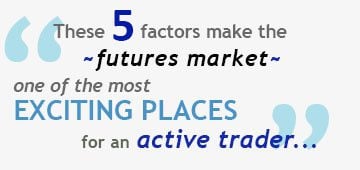
Futures are not a natural place to start trading, but it surprises me when I talk to experienced equities and options traders that have never considered the benefits of trading futures. So, while futures may not be right for everyone’s portfolio, they’re right for mine. Here are five reasons why I trade futures.
1. Macro vs. Micro Risks:
With futures, traders can focus on macro instead of micro factors. This means looking at the direction the stock market and economy are moving as a whole, instead of pouring through earnings reports and corporate announcements. Looking at the forest, instead of just the trees, requires less specialized knowledge and research than diving through dozens of 10-Ks and earnings calls.
2. Transparency:
Michael Lewis’ Flash Boys brought to the forefront ways equity markets can lack transparency. In dark pools, equity trades happen without anyone knowing how much or at what prices for days. This is not the case with futures contracts. All traders, from individuals to hedge funds, can see the same activity as it happens in the order book – whether that is price, volume history or open interest.
3. 24-Hour Markets:
Many futures markets trade 24/5. This means you can more actively manage your position while events occur outside of normal business hours. While ETF and equity-options traders are worried about where their positions may open for the day, the futures trader can be actively managing their position.
4. Leverage:
Futures traders can buy approximately $100,000 worth of S&P 500 stocks for less than $5,000 margin or buy $80,000 in technology stocks for less than $4,000. That 20:1 margin is five times as high as the 4:1 leverage on equities. Futures traders should be aware that the use of leverage can significantly increase the risk of loss, but can also serve as a useful tool when used with discretion and under appropriate circumstances. Used responsibly, leverage is a tool that ties up less capital and opens more opportunities.
5. Consistent Opportunities:
To take full advantage of many trading strategies, whether options strategies or selling short, traders need approved accounts, often with high balances. Some of these same restrictions don’t apply with futures accounts. For example, traders that day trade four equities or equity option positions in five business days will be flagged as a pattern day trader – meaning they suddenly need a minimum balance of $25,000. And even if you are approved to sell stocks short, certain stocks may be “none to borrow” or “hard to borrow,” meaning that you physically can’t sell certain stocks short. This is not the case with futures contracts. If you think the equity futures are going lower, you can always sell a contract or two – buying it back at your convenience.
All of these factors make the futures market one of the most exciting places for an active trader.
What we’re building here at Tradovate will only make that experience better.
I invite you to be one of the first to stay up to date on our progress – share your email address here to learn more.
Rick



